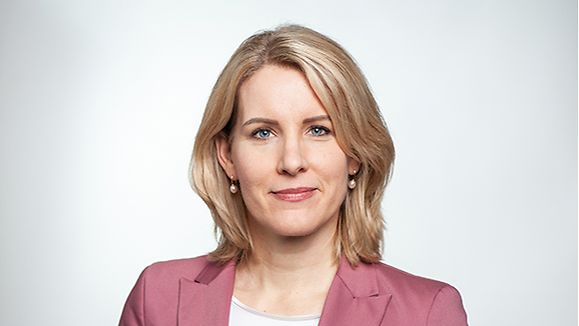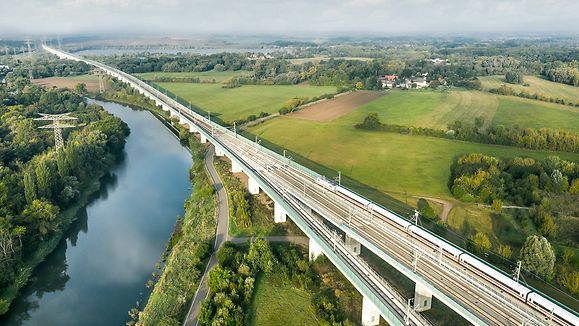Structural Change
News from the Regions in Structural Change | January 2022
Germany's regions in structural change are increasing their buiness attractiveness, with innovative energy and mobility solutions at the forefront of this progress.
Jan 31, 2022
- Zwickau becomes Audi’s largest electric vehicle production site
- Halle and Leipzig climb Wirtschaftswoche city rankings
- Structural change to create new jobs as part of coal phase-out
- Tesvolt secures new funding of 40 million euros
- Enertrag and Sunfire sign hydrogen cooperation agreement
- Bremen company celebrates successful Galileo lift-off
- Ocean technology campus comes to Rostock
Zwickau becomes Audi’s largest electric vehicle production site
Zwickau has established itself as VW subsidiary Audi’s largest production site for electric vehicles – just six months after the launch of the Q4 e-tron. Around 350 Audi employees currently support production at the site in Saxony. Audi plans to launch new models with electric drive only from 2026. Volkswagen has invested around EUR 1.2 billion in turning the production facility into a pure electric vehicle factory producing a range of Audi, VW and Seat vehicle models.
Halle and Leipzig climb Wirtschaftswoche city rankings
The cities of Halle and Leipzig in Eastern Germany have climbed the annual Wirtschaftswoche City Test rankings, with Halle making the greatest leap – from 42nd place to 18th overall. Leipzig has consolidated its top ten position within the ranking, climbing from eighth to third spot. High quality of life and increased economic dynamism are making cities and towns across eastern Germany a more attractive business proposition as reflected by the Wirtschaftswoche findings. Facilities like the Weinberg Campus Technology Park outside Halle have proven to be growth engines, providing companies with access to world-renowned research institute partners.
Structural change to create new jobs as part of coal phase-out
Up to 27,000 new jobs will be created in the former coal-mining region of North Rhine-Westphalia according to a report conducted by the German Economic Institute (IW) Cologne. Germany’s planned coal phase-out by 2030 will see more than 14,000 jobs lost due to coal mine and power plant closures according to the report authors. Significant government investment of almost EUR 15 billion in the years ahead will see new jobs created in industry, digitalization and environmental transformation as North Rhine-Westphalia transforms its regional economy. Germany’s government has earmarked around EUR 40 billion in total over the next decade to support coal regions in transformation.
Tesvolt secures new funding of 40 million euros
Wittenberg-based energy storage start-up Tesvolt recently secured new funding of EUR 40 million in its latest financing round. The funds are provided by a consortium of investors from the Liechtenstein Group, a group of companies owned by the Liechtenstein family. The company plans to use the financing to accelerate its international activities and further invest in research and development. International sales already exceed 40 percent, with US market entry planned for the coming year.
Enertrag and Sunfire sign hydrogen cooperation agreement
Renewable energy company Enertrag and electrolyisis manufacturer Sunfire have signed a cooperation agreement to establish a hydrogen electrolysis test field in Prenzlau. Electrolysers with a total capacity of up to 15 MW will be installed, tested and operated at the Brandenburg site. The hydrogen center will be directly integtated into the Uckermark integrated power plant, using renewable energy only for the electrolysis procedure. The green hydrogen energy produced will be used primarily in the mobility sector and local public transport in particular. The first hydrogen filling station in the region is also being built in Prenzlau.
Bremen company celebrates successful Galileo lift-off
Bremen aerospace company OHB celebrated the successful launch of batch three Galileo FOC satellites in December. OHB Sytems AG, a subsidiary of the OHB group, ist the main industrial contractor for the Galileo FOC satellites produced for the European Space Agency. Twenty-eight Galileo satellites – of which 24 were designed and integrated by OHB – are now orbiting in space.
Ocean technology campus comes to Rostock
Plans have been announced to turn the Nienhagen artificial reef in the Baltic Sea into an ocean technology campus with digital ocean laboratory facilities. A modern underwater lab will be built near the coastal town of Warnemünde, providing up to 300 hectares of research space for researchers and companies alike. The cluster has received EUR 15 million in funding from the Clusters4Future program. The city of Rostock is also a beneficiary of the government’s Gaia-X cloud initiative which includes the intelligent networking of geodata and object data at sea.

